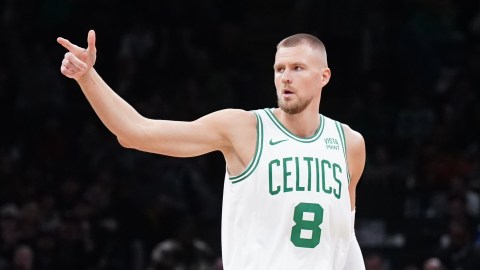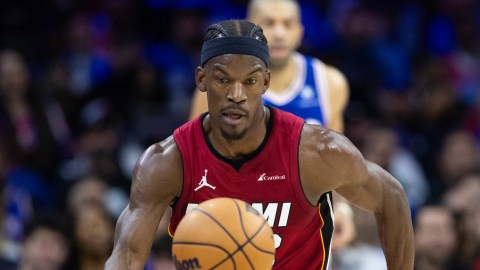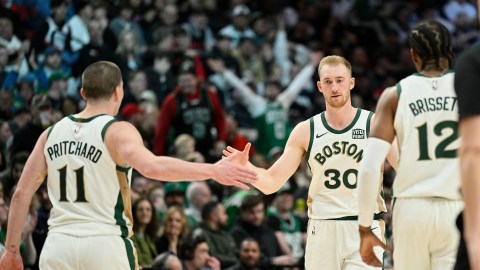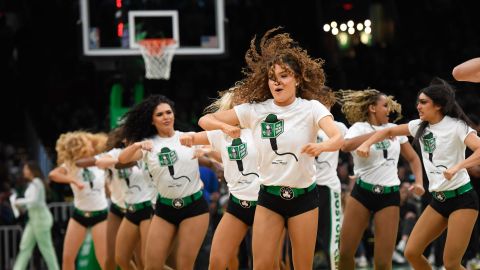 For the last half-decade, the Celtics were held up as a paragon of unselfish virtue.
For the last half-decade, the Celtics were held up as a paragon of unselfish virtue.
Under Doc Rivers, with Paul Pierce and Kevin Garnett leading the way alongside Ray Allen — yes, he had a hand in all that success, too, no matter what you might say — the Celtics did not care who scored the points or got the glory, so long as the job got done. Their selflessness delivered a championship banner to Boston, and may have brought one or two more if not for some ill-timed injuries.
Rivers, Pierce, Garnett and Allen are all gone now. With them went the stories about how three future Hall of Famers who shared the ball, played within the system no matter its drain on their individual statistics and defined what it meant to be a “team.” In their place is left a much less ballyhooed group — which so far has demonstrated exactly the same values.
Whereas the names are not as recognizable and Brad Stevens‘ offense looks much different, the Celtics have been just as unselfish with the basketball. That they have done so with fewer proven shot-makers and without one of the NBA’s leading assist men in Rajon Rondo, on a team widely expected to go nowhere, makes these Celtics’ willingness to share the ball arguably as impressive as any during the so-called “Big Three” era.
“We haven’t been worried too much about selfishness,” said Gerald Wallace, who called out his teammates for being inconsistent with their effort (a persistent problem even when Pierce, Garnett and Allen were in town) but never accused them of being stingy with the ball. “We’ve shared the ball a lot. Guys that are open are getting the ball, getting their shots. Our main thing is staying together offensively as far as running our plays, knowing the offense. We know guys are going to share the ball and get open shots. We’ve just got to continue to do that.”
Throughout the previous administration, the Celtics were consistently one of the top four teams in the NBA in assists. Their percentage of field goals assisted ranged from 63 percent to a high of 66 percent in 2011-12, making it easy to fit a frame around three grizzled greats sacrificing their shots for the good of the team.
Yet here is some food for thought: In the championship season of 2007-08, the Celtics recorded assists on 61 percent of their baskets. In the final year of the Rivers-Pierce-Garnett triumverate, the Celtics again recorded assists on 61 percent of their baskets.
The Celtics’ assist percentage in eight preseason games this year: 61 percent.
This is not to claim that this group is headed for banner 18 or that the idea that Pierce, Garnett and Allen each gave something of themselves for the championship cause is incorrect. In a way, though, it can be easier to convince a player to give up his shots if the reward is a ring. Veterans like Wallace, Brandon Bass, Jeff Green and Courtney Lee have nothing to play for other than their paychecks and their pride. One or the other has so far kept any of them from undermining a rebuilding effort they will never enjoy the fruits of.
“That’s who we are,” Stevens said. “I think that’s who we have to be. Guys are very capable on any given night and guys are very capable of being consistent. But we’ve got to be more of a collective unit than individuals. I think the guys will be that and we really showed that with our play in the preseason.
“Although at times we’ve missed open guys, we haven’t missed open guys all that often. We need to get the ball in the post more, but for the most part, we share the ball.”
The leader of the ball-movement movement has been Phil Pressey, an undrafted rookie guard whose father, Paul Pressey, was once an assistant coach with the Celtics. The younger Pressey led the Celtics with 4.0 assists per game in the preseason, bringing players on the bench to their feet at times with some of his pinpoint passes. Pressey, listed at an extremely generous 5-foot-11, has injected some excitement into the preseason along with fellow undrafted rookie Vitor Faverani.
Still, rookies like Pressey, Faverani and Kelly Olynyk have to be unselfish. They have to prove they can play, not just score, before they get a foothold in the league. A player like Wallace could just as easily blow up the entire operation. A former All-Star with an eight-figure contract might not normally have any interest in playing within the boundaries set by a rookie NBA coach on a rebuilding team.
Instead of pouting, however, Wallace has been the veteran who has most bought in. He averaged 3.2 assists per game in the preseason, the second-most on the team behind Pressey, and only expressed frustration when his teammates did not play hard. After a disappointing season on the star-filled but plodding Brooklyn Nets, Wallace has to be having at least a little fun flying and up and down the court — and occasionally off it — as he did in his prime in Charlotte.
The main questions are how long this will last and what the payoff is if it does. Perhaps Wallace is merely playing a good soldier so some contender will try to pick him up at the trade deadline. Maybe players will begin looking off their teammates and forcing their own shots once the losses pile up. It’s entirely possible that this is all a product of irrational exhibition exuberance and that none of it is sustainable.
At this moment, though, with the regular season about to begin, the Celtics are showing the same unselfishness they demonstrated at the height of their powers in recent years. Only this time, they are doing it without the championship carrot at the end of the stick.
Have a question for Ben Watanabe? Send it to him via Twitter at @BenjeeBallgame or send it here.



